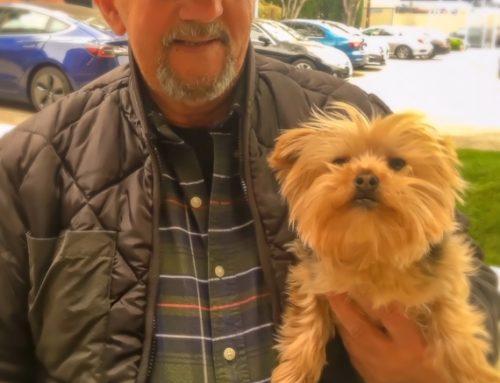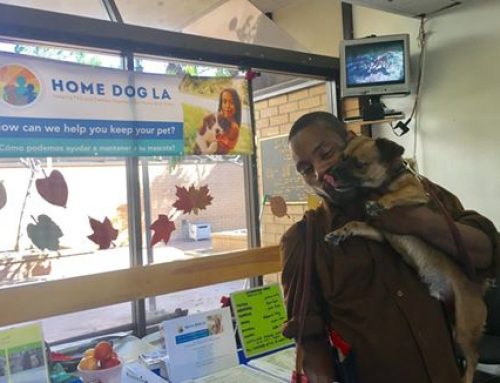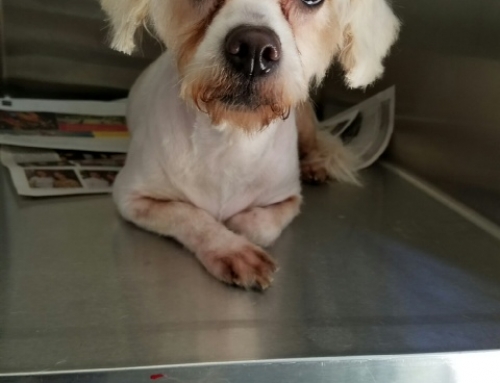LOVE ON A LEASH
Formerly homeless dogs offer love to humans who’ve suffered the same fate
By Amy Tenowich 10/20/2011
“Come on, Peaches!” a spunky woman says enthusiastically as she enters the Skid Row Housing Trust office in downtown LA with an orange and white whippet. The little pup sniffs around and greets the other humans and canines waiting to go for their weekly stroll a few blocks to Pershing Square.
Since 1989, the nonprofit Skid Row Trust (aka the Trust) has preserved, built and operated extremely low-rent housing for LA’s homeless. Financed by government grants, foundation support and private contributions, the Trust currently has 1,492 tenants placed in 22 downtown apartment buildings and runs programs aimed at keeping them from winding up back on the streets.
While residents now have the security of a safe place to sleep, the no-pet policy leaves a void in those who equate “home” with having an animal. But now, thanks to an innovative new program, humans and animals are reconnecting.
“I wanted to figure out a way to have some animal time, so residents can benefit from the love that they give us,” says Jordan Press, resident services coordinator at the Trust and creator of the Dog Play event. Press saw flyers near her office for Downtown Dog Rescue, an organization that rehabilitates and carefully places formerly homeless, abused and neglected dogs into loving homes. She called, hoping to find volunteers willing to bring once-stray pooches to hang out with the Trust’s tenants who miss animal companionship. Since January 2010, up to 30 humans and dogs have gathered from 10:45 a.m. till noon every Wednesday to walk then relax together on the grass for some bonding.
Retiree Burt Dragotis of Pasadena, a volunteer with the Downtown Dog Rescue, has been coming every week with his furry wards Carley, Puppy and Greta, who has an endearing little snaggletooth. “Every Wednesday morning, these guys know what time it is,” Dragotis says of his leashed companions, whose tail wags and rump sways reveal their excitement.
Dragotis also looks forward to the weekly visits. “These guys are, all in their own way, very touching,” he says of the residents. “Part of it is being aware of life that isn’t so good for everyone.” Dragotis says he enjoys the immediate gratification of seeing the dogs and the people interacting. “For the majority of the world, it’s pretty damn tough.”
Upon arrival at Pershing Square near Fifth and Hill streets, Press pours water from a thermos into three shiny bowls she’s pulled from her backpack. She opens a baggie of jerky treats and passes them out to the humans to give to the dogs. “Sometimes, I think I feel my dogs and my cats at night, rubbing up against me, sleeping beside me,” says Pamela, a Trust tenant, about pets she’s had in the past. She’s a refined woman, sporting a short and sassy haircut, who’d lived on the streets for more than four years before getting housing through the Trust in early 2009. “When it gets to be Sunday, I say, ‘Oh good, Wednesday is coming!’ They’re all so happy to be with us, and it gives me at least one day a week that I can give my love to a little four-legged.”
The meetings provide more than just animal companionship. “One of the surprising effects that have been really cool has been the relationships that have developed between the volunteers and the residents,” Press says.
Although the Trust provides a variety of services, many focused on health and addiction issues, Dog Play is one of the offerings where residents can just talk with regular folks — not trained professionals — who have nothing to do with their daily struggles. The result has been residents feeling they have something of value to offer, be it comforting a volunteer whose dog was just diagnosed with a brain tumor or simply showing their appreciation by consistently showing up.
“I enjoy the responsibility to Jordan, the dogs and to Burt,” says Rudy, a man with dark eyes and a ponytail, while gently running a brush over Carley’s multicolored back. “I was into drugs before. These kinds of things keep me centered.”
Rudy’s been sober for more than a year. He refers to Dragotis as a friend and like the other residents in the group, feels good about being able to give love to dogs who strike a chord in him.
“I can relate to the animals, because I feel that I was rescued,” says Rudy. Pamela echoes the sentiment of knowing the lonely feeling of losing everything but then finding someone willing to lend a helping hand. While there are still hardships, it seems the dogs give her and the others the comfort of feeling they aren’t battling life’s demons alone.
“We’re birds of a feather who are trying to survive,” she says of the bond between the animals and humans. “They help us just by loving us. What more can we ask for?”




